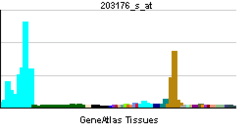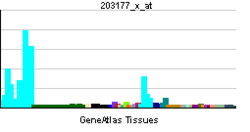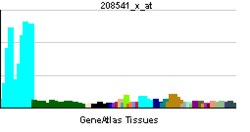TFAM
| View/Edit Human | View/Edit Mouse |
Mitochondrial transcription factor A, abbreviated as TFAM or mtTFA, is a protein that in humans is encoded by the TFAM gene.[3][4]
Function
This gene encodes a mitochondrial transcription factor that is a key activator of mitochondrial transcription as well as a participant in mitochondrial genome replication. TFAM bends mitochondrial promoter DNA to aid transcription of the mitochondrial genome. Studies in mice have demonstrated that this gene product is required to regulate the mitochondrial genome copy number and is essential for embryonic development. A mouse model for Kearns-Sayre syndrome was produced when expression of this gene was eliminated by targeted disruption in heart and muscle cells.[4]
Interactions
TFAM has been shown to interact with TFB1M.[5]
References
- ↑ "Human PubMed Reference:".
- ↑ "Mouse PubMed Reference:".
- ↑ Tiranti V, Rossi E, Ruiz-Carrillo A, Rossi G, Rocchi M, DiDonato S, Zuffardi O, Zeviani M (Jul 1995). "Chromosomal localization of mitochondrial transcription factor A (TCF6), single-stranded DNA-binding protein (SSBP), and endonuclease G (ENDOG), three human housekeeping genes involved in mitochondrial biogenesis". Genomics. 25 (2): 559–64. doi:10.1016/0888-7543(95)80058-T. PMID 7789991.
- 1 2 "Entrez Gene: TFAM transcription factor A, mitochondrial".
- ↑ McCulloch V, Shadel GS (Aug 2003). "Human mitochondrial transcription factor B1 interacts with the C-terminal activation region of h-mtTFA and stimulates transcription independently of its RNA methyltransferase activity". Mol. Cell. Biol. 23 (16): 5816–24. doi:10.1128/MCB.23.16.5816-5824.2003. PMC 166325
 . PMID 12897151.
. PMID 12897151.
Further reading
- Tominaga K, Akiyama S, Kagawa Y, Ohta S (1992). "Upstream region of a genomic gene for human mitochondrial transcription factor 1.". Biochim. Biophys. Acta. 1131 (2): 217–9. doi:10.1016/0167-4781(92)90082-b. PMID 1610904.
- Fisher RP, Lisowsky T, Parisi MA, Clayton DA (1992). "DNA wrapping and bending by a mitochondrial high mobility group-like transcriptional activator protein.". J. Biol. Chem. 267 (5): 3358–67. PMID 1737790.
- Parisi MA, Clayton DA (1991). "Similarity of human mitochondrial transcription factor 1 to high mobility group proteins.". Science. 252 (5008): 965–9. doi:10.1126/science.2035027. PMID 2035027.
- Tominaga K, Hayashi J, Kagawa Y, Ohta S (1993). "Smaller isoform of human mitochondrial transcription factor 1: its wide distribution and production by alternative splicing.". Biochem. Biophys. Res. Commun. 194 (1): 544–51. doi:10.1006/bbrc.1993.1854. PMID 8333869.
- Larsson NG, Oldfors A, Garman JD, Barsh GS, Clayton DA (1997). "Down-regulation of mitochondrial transcription factor A during spermatogenesis in humans.". Hum. Mol. Genet. 6 (2): 185–91. doi:10.1093/hmg/6.2.185. PMID 9063738.
- Lezza AM, Pesce V, Cormio A, Fracasso F, Vecchiet J, Felzani G, Cantatore P, Gadaleta MN (2001). "Increased expression of mitochondrial transcription factor A and nuclear respiratory factor-1 in skeletal muscle from aged human subjects.". FEBS Lett. 501 (1): 74–8. doi:10.1016/S0014-5793(01)02628-X. PMID 11457459.
- Takamatsu C, Umeda S, Ohsato T, Ohno T, Abe Y, Fukuoh A, Shinagawa H, Hamasaki N, Kang D (2002). "Regulation of mitochondrial D-loops by transcription factor A and single-stranded DNA-binding protein.". EMBO Rep. 3 (5): 451–6. doi:10.1093/embo-reports/kvf099. PMC 1084112
 . PMID 11964388.
. PMID 11964388. - Falkenberg M, Gaspari M, Rantanen A, Trifunovic A, Larsson NG, Gustafsson CM (2002). "Mitochondrial transcription factors B1 and B2 activate transcription of human mtDNA.". Nat. Genet. 31 (3): 289–94. doi:10.1038/ng909. PMID 12068295.
- Reyes A, Mezzina M, Gadaleta G (2002). "Human mitochondrial transcription factor A (mtTFA): gene structure and characterization of related pseudogenes.". Gene. 291 (1-2): 223–32. doi:10.1016/S0378-1119(02)00600-5. PMID 12095695.
- Yoshida Y, Izumi H, Ise T, Uramoto H, Torigoe T, Ishiguchi H, Murakami T, Tanabe M, Nakayama Y, Itoh H, Kasai H, Kohno K (2002). "Human mitochondrial transcription factor A binds preferentially to oxidatively damaged DNA.". Biochem. Biophys. Res. Commun. 295 (4): 945–51. doi:10.1016/S0006-291X(02)00757-X. PMID 12127986.
- Garrido N, Griparic L, Jokitalo E, Wartiovaara J, van der Bliek AM, Spelbrink JN (2003). "Composition and dynamics of human mitochondrial nucleoids.". Mol. Biol. Cell. 14 (4): 1583–96. doi:10.1091/mbc.E02-07-0399. PMC 153124
 . PMID 12686611.
. PMID 12686611. - Yoshida Y, Izumi H, Torigoe T, Ishiguchi H, Itoh H, Kang D, Kohno K (2003). "P53 physically interacts with mitochondrial transcription factor A and differentially regulates binding to damaged DNA.". Cancer Res. 63 (13): 3729–34. PMID 12839966.
- McCulloch V, Shadel GS (2003). "Human mitochondrial transcription factor B1 interacts with the C-terminal activation region of h-mtTFA and stimulates transcription independently of its RNA methyltransferase activity.". Mol. Cell. Biol. 23 (16): 5816–24. doi:10.1128/MCB.23.16.5816-5824.2003. PMC 166325
 . PMID 12897151.
. PMID 12897151. - Deschauer M, Kiefer R, Blakely EL, He L, Zierz S, Turnbull DM, Taylor RW (2003). "A novel Twinkle gene mutation in autosomal dominant progressive external ophthalmoplegia.". Neuromuscul. Disord. 13 (7-8): 568–72. doi:10.1016/S0960-8966(03)00071-3. PMID 12921794.
- Günther C, von Hadeln K, Müller-Thomsen T, Alberici A, Binetti G, Hock C, Nitsch RM, Stoppe G, Reiss J, Gal A, Finckh U (2005). "Possible association of mitochondrial transcription factor A (TFAM) genotype with sporadic Alzheimer disease.". Neurosci. Lett. 369 (3): 219–23. doi:10.1016/j.neulet.2004.07.070. PMID 15464268.
- Kanki T, Ohgaki K, Gaspari M, Gustafsson CM, Fukuoh A, Sasaki N, Hamasaki N, Kang D (2004). "Architectural role of mitochondrial transcription factor A in maintenance of human mitochondrial DNA.". Mol. Cell. Biol. 24 (22): 9823–34. doi:10.1128/MCB.24.22.9823-9834.2004. PMC 525493
 . PMID 15509786.
. PMID 15509786. - Cam H, Balciunaite E, Blais A, Spektor A, Scarpulla RC, Young R, Kluger Y, Dynlacht BD (2004). "A common set of gene regulatory networks links metabolism and growth inhibition.". Mol. Cell. 16 (3): 399–411. doi:10.1016/j.molcel.2004.09.037. PMID 15525513.
This article is issued from Wikipedia - version of the 5/20/2016. The text is available under the Creative Commons Attribution/Share Alike but additional terms may apply for the media files.


